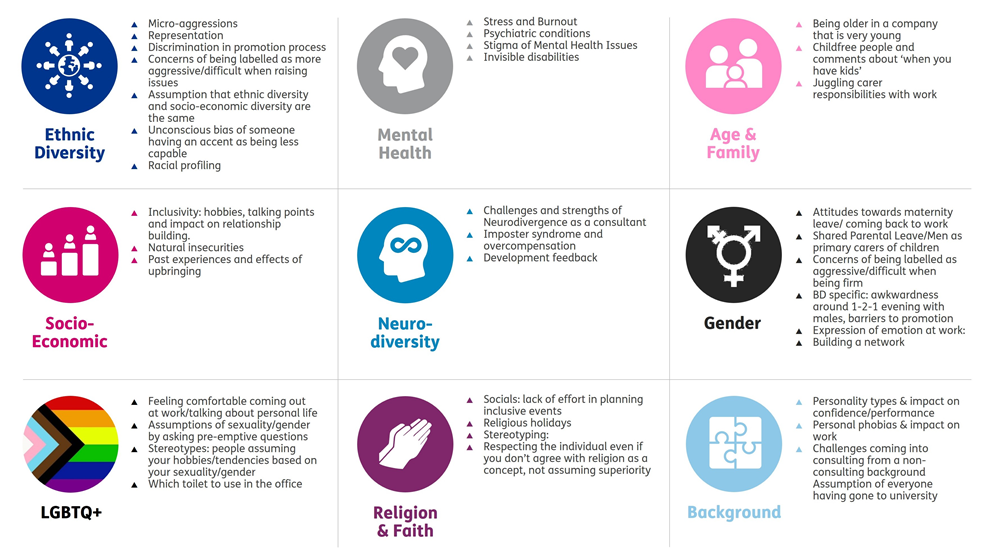
Reverse mentoring: turning Diversity and Inclusion on its head
2 March 2022
Ellie Taylor, Manager in our Energy and Resources team and a key part of our Diversity and Inclusion (D&I) initiative talks about how our Reverse Mentoring scheme is shaking up the conversation around D&I.

I grew up at different international schools across Europe, formed childhood friendships in an international community and so, saw the wealth of possibilities a diverse and inclusive environment creates. This spurred me on to make Diversity and Inclusion (D&I) part of my every day. And I’ve been able to do just that at Baringa, rolling out an internal Reverse Mentoring programme across the last 18 months.
As a business, we don’t shy away from having honest conversations across our business and shining a light on any inadvertent biases and pre-conceived ideas. Pairing up senior leaders with junior colleagues is a big part of that.
Unearthing personal blind spots
During a session in our recent D&I Reverse Mentoring programme, one of our mentors posed this hard-hitting question to their mentee: “Why is COVID killing people of colour?”. What followed was a frank discussion on ethnic diversity, systemic racism and the effects on recruitment – ultimately unearthing unintentional personal blind spots on the subject of race that might otherwise have not surfaced.
Walking in someone else’s shoes
Reverse Mentoring does what it says on the tin. It’s mentoring turned on its head – where a senior leader is mentored by a more junior employee. The idea is that everyone has something to teach others, regardless of the number of years they’ve clocked up. I like to think of it as understanding what it’s like to walk a day at Baringa in someone else’s shoes. The overriding focus: delving into D&I and the many ways it shapes the person we are at work, whilst getting our leaders to practice empathy and active listening.
We’ve taken that premise one step further. It’s far from a handful of people that have risen to the challenge; our scheme has seen nearly 200 senior leaders reverse mentored. It’s something we are asking every one of them to do. It not only supports our principle of flat hierarchy, it also hones skills of active listening, empathy, and ultimately encourages more inclusive leadership in the business as a result.
Part of our everyday
We’ve scaled this programme from the very beginning. Other organisations might start something like this at Board level whereas we’ve targeted all our leaders from the start. Nearly 100% of our 100 person partnership group has participated in the programme, and 75% of our next level of senior leaders (Directors). These have all involved rich, meaningful one-to-one conversations on topics like sexual orientation, age, socio-economic status, mental health, disability and neurodiversity.
With each mentor and mentee committing four hours of their time, that’s an impressive 800 hours devoted to talking about D&I. It’s had a big impact in a short period of time. And we’re not stopping there.
What’s been absolutely phenomenal is that as an organisation we’re now purposely creating time and space to talk about these fundamental issues. Making diversity and inclusion part of our everyday conversations is just as important as delivering lasting impacts with our clients.
Constantly evolving dialogue
D&I can sometimes be passed off as buzzword, with a stagnant view of what conversations can come under its banner. Initially gathering momentum around gender and race, the dialogue has broadened dramatically. Through this programme we’re reinforcing that everyone can and should be able to have a constructive conversation on D&I, and to think about the huge variety of lenses that encompass inclusivity. As individuals, we are an intersection of so many of these different lenses – see our suggested topics list below for how we bring this to life on the programme.
It’s a time of great awakening in our Reverse Mentoring programme, as we explore how these issues affect us all – our staff, our clients and the world at large. Asking the sometimes awkward questions in a quest to educate and understand each other better. We’re calling out unconscious bias, exploring the effects of background and upbringing on treatment in the workplace, and asking leadership their opinions on topics they may have never been challenged on previously.
Shaping a more inclusive culture
Our aim is to create time and space in our working day to talk about these important issues and set small, everyday change in motion to become a more inclusive business at every level. And with leadership at the heart of this, it’s directly shaping the future of our organisation. As one mentor put it: “Together, I feel like we’ve contributed to building a better and more inclusive Baringa.” In the words of a mentee (the senior leader): “I’m challenging myself to be comfortable to have D&I conversations, educate myself and read more, consider more the alternative view points from others.”
With phase two of the programme already well under way, we now need to keep the momentum of these D&I communication and personal reflections going. Through this journey we’ve made such great strides already. And I am expecting even richer, more challenging and more constructive conversations to come.
(click to enlarge the image)
Every moment of our existence has shaped the people we are today. Those moments will then intertwine with our next experiences to form the people we are becoming. Beyond transforming ourselves, these moments, if shared, create a butterfly effect that can transform other people too. By telling the stories of the path we’ve walked, we have an opportunity to create change all around us.
We are running a series of reflective pieces, where brilliant people from within Baringa will share their journeys as individuals or members of our company and community. Their stories will reflect the diverse lived experiences we have had and consequently, the diverse individuals we are becoming. We also bring light to Baringa’s wider journey to weave diversity and inclusion into the fabric of our people and our firm.
We hope amongst these stories, you will find wisdom and community. That they will be another moment of existence for us all that shape the people and organisations we are becoming. Creating change, if we might be so bold, to more diverse and inclusive ends.
Is digital and AI delivering what your business needs?
Digital and AI can solve your toughest challenges and elevate your business performance. But success isn’t always straightforward. Where can you unlock opportunity? And what does it take to set the foundation for lasting success?
